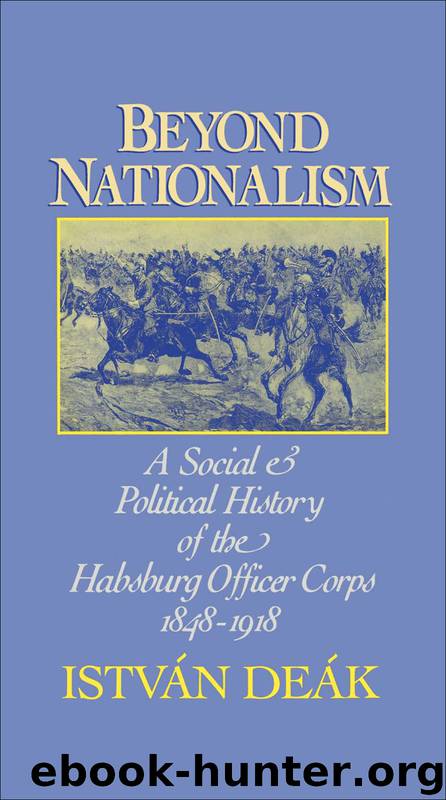Beyond Nationalism by Deák István;

Author:Deák, István;
Language: eng
Format: epub
Publisher: Oxford University Press, Incorporated
Published: 1990-02-20T16:00:00+00:00
Other Crimes and Military Court Procedures
The basic principle of the Habsburg military jurisdiction was that all infractions of the code of behavior as well as all crimes ought to be settled within the “family,” including crimes against civilians. The relevant military penal code was first systematized under Maria Theresa and was reformed several times, most significantly in 1884.
The theory was that courts of honor made up of fellow regimental (later also divisional) officers should handle all matters concerning an officer’s honor, such as duels, drunkenness, failure to pay debts, insults, refusal to offer satisfaction, lack of discretion, concubinage, adultery, tactless behavior, keeping unsuitable company, making false reports, and so on.24 Gradually, however, more and more of these problems were taken over by regular military courts, which had always handled the more serious crimes, such as espionage, treason, incitement to mutiny, murder, assault, and crimes against property.
In time, the exclusivity and unusual procedures of the military courts came under public attack as an anomaly in a society and state where even the Catholic church had lost most of its ancient jurisdictional privileges; still, the army managed to prevent any serious tampering with its privileges.
The practices of the Austro-Hungarian military courts were so complex (frankly, I have been unable to understand them fully) as to preclude a detailed analysis. Perhaps it is enough to state here that both investigation and trial were held in secret (even noninvolved members of the armed forces being excluded); that, at least before the reform era, the court included two representatives of each rank, from private up; and that voting always began with the two privates, so as to prevent their intimidation by the opinion of their superiors.* The examining magistrate, prosecutor, counsel, and expert judge was one and the same judge advocate (Militärauditor), the only qualified lawyer in court. Clearly, his recommendation was crucial, especially as long as there were rank-and-file judges, who may not have fathomed the meaning of the whole procedure. The defendant was entitled to an interpreter but never to a civilian lawyer. The verdict was announced by a roll of drums, actually, the only way for friends and relatives assembled in the courtyard to know that the proceedings were over. The verdict was then passed on to the commander of the garrison, who could, but rarely did, mitigate or even reverse the sentence. An appeal was seldom possible.25
If all this sounds arbitrary, it was. If it also sounds unjust, it should be noted as well that the Auditore generally took their task very seriously, and that they did in effect plead for the defense as well as for the prosecution. We have seen already that, in the postreform period at least, verdicts pronounced on enlisted men were surprisingly mild, and that death sentences and executions were very rare indeed. As for the officers, so few were tried as to defy an in-depth analysis. In 1911, for instance, courts of honor cashiered only nine officers, and military courts sixteen officers (ten lieutenants, three first lieutenants, and three captains).
Download
This site does not store any files on its server. We only index and link to content provided by other sites. Please contact the content providers to delete copyright contents if any and email us, we'll remove relevant links or contents immediately.
| Africa | Americas |
| Arctic & Antarctica | Asia |
| Australia & Oceania | Europe |
| Middle East | Russia |
| United States | World |
| Ancient Civilizations | Military |
| Historical Study & Educational Resources |
Room 212 by Kate Stewart(5120)
The Crown by Robert Lacey(4815)
Endurance: Shackleton's Incredible Voyage by Alfred Lansing(4782)
The Iron Duke by The Iron Duke(4354)
The Rape of Nanking by Iris Chang(4213)
Joan of Arc by Mary Gordon(4110)
Killing England by Bill O'Reilly(4001)
Say Nothing by Patrick Radden Keefe(3985)
I'll Give You the Sun by Jandy Nelson(3447)
Shadow of Night by Deborah Harkness(3368)
Hitler's Monsters by Eric Kurlander(3342)
Mary, Queen of Scots, and the Murder of Lord Darnley by Alison Weir(3210)
Blood and Sand by Alex Von Tunzelmann(3203)
Eleanor & Park by Rainbow Rowell(3173)
Darkest Hour by Anthony McCarten(3133)
Margaret Thatcher: The Autobiography by Thatcher Margaret(3082)
Book of Life by Deborah Harkness(2939)
Red Famine: Stalin's War on Ukraine by Anne Applebaum(2934)
The One Memory of Flora Banks by Emily Barr(2863)
